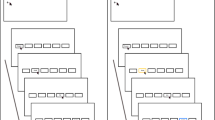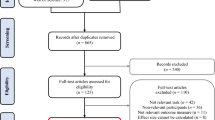Abstract
Previous research has found that cognitive biases in attention, interpretation, and memory play an important role in depression. However, there is little knowledge of the interplay between these biases in clinical depression. The present study was aimed to model different pathways of relation among attention, interpretation and autobiographical memory biases, and to examine their contribution to account for depression status outcomes. Cognitive biases were evaluated in a sample comprising 22 currently-depressed and 36 never-depressed individuals representing a broad range of depression severity levels. Cognitive biases were assessed by three separate tasks using different types of stimuli. Our main finding was a significant indirect effect model in which attention bias to negative faces was linked to greater negative memory bias via its association with negative interpretation bias. Within this model, the specific pathway between attention bias to negative faces and negative interpretation bias accounted both for significant variance in depression severity as well as for depression diagnostic status. These findings increase our understanding of the complex interplay between cognitive mechanisms involved in clinical depression and highlight hypothetical pathways relevant for future interventions.
Similar content being viewed by others
Notes
We explored this possibility in our study by testing an integrative model comprising the pathway attention to happy faces ⟶ attention to sad faces ⟶ interpretation ⟶ memory. These exploratory analyses supported an indirect effect in which attention bias to positive information influenced negative memory bias by its influence on attention bias to negative information and the influence of attention bias to negative information in negative interpretation bias. Moreover this integrative explanatory model also contributed significantly to the prediction of depression status outcomes in the study. This set of explanatory analyses is available upon request.
References
Armstrong, T., & Olatunji, B. O. (2012). Eye tracking of attention in the affective disorders: a meta-analytic review and synthesis. Clinical Psychology Review, 32, 704–723. doi:10.1016/j.cpr.2012.09.004.
Beck, A. T., Epstein, N., Brown, G., & Steer, R. A. (1988). An inventory for measuring clinical anxiety: Psychometric properties. Journal of Consulting and Clinical Psychology, 56, 893–897.
Beck, A. T., Steer, R. A., & Brown, G. K. (1996). BDI-II. Beck Depression Inventory-second edition. Manual. San Antonio: The Psychological Corporation.
Blaut, A., Paulewicz, B., Szastok, M., Prochwicz, K., & Koster E.H.W. (2013). Are attentional bias and memory bias for negative words causally related?. Journal of Behavior Therapy and Experimental Psychiatry, 44, 293–299. doi:10.1016/j.jbtep.2013.01.002.
Calvo, M. G., & Avero, P. (2005). Time course of attentional bias to emotional scene in anxiety: Gaze direction and duration. Cognition and Emotion, 19, 433–451. doi:10.1080/02699930441000157.
Chun, M. M., & Turk-Browne, N. B. (2007). Interactions between attention and memory. Current Opinion in Neurobiology, 17, 177–184. doi:10.1016/j.conb.2007.03.005.
Clark, D. A., Beck, A. T., & Alford, B. A. (1999). Scientific foundations of cognitive theory and therapy of depression. New York: Wiley.
De Raedt, R., & Koster, E. H.W. (2010). Understanding vulnerability for depression from a cognitive neuroscience perspective: A reappraisal of attentional factors and a new conceptual framework. Cognitive, Affective, and. Behavioral Neuroscience, 10, 50–70. doi:10.3758/CABN.10.1.50.
Duque, A., & Vazquez, C. (2015). Double attention bias for positive and negative emotional faces in clinical depression: Evidence from an eye-tracking study. Behavior Therapy and Experimental Psychiatry, 46, 107–114. doi:10.1016/j.jbtep.2014.09.005.
Ellis, A. J., Wells, T. T., Vanderlind, W. M., & Beevers, C. G. (2014). The role of controlled attention on recall in major depression. Cognition and Emotion, 3, 520–529. doi:10.1080/02699931.2013.832153.
Everaert, J., Duyck, W., & Koster, E. H. W. (2014). Attention, interpretation, and memory biases in subclinical depression: A proof-of-principle test of the combined cognitive biases hypothesis. Emotion, 14, 331–340. doi:10.1037/a0035250.
Everaert, J., Duyck, W., & Koster, E. H. W. (2015). Emotionally biased cognitive processes: The weakest link predicts prospective changes in depressive symptom severity. PloS ONE, 10, e0124457. doi:10.1371/journal.pone.0124457.
Everaert, J., Koster, E. H. W., & Derakshan, N. (2012). The combined cognitive bias hypothesis in depression. Clinical Psychology Review, 32, 414–424. doi:10.1016/j,cpr.2012.04.003.
Everaert, J., Tierens, M., Uzieblo, K., & Koster, E. H. W. (2013). The indirect effect of attention bias on memory via interpretation bias: evidence for the combined cognitive bias hypothesis in subclinical depression. Cognition and Emotion, 27, 1450–1459. doi:10.1080/02699931.2013.787972.
First, M. B., Spitzer, R. L., Gibbon, M., & Williams, J. B. W. (1996). Structured Clinical Interview for DSM-IV Axis I Disorders, Clinician Version (SCID-CV). Washington, DC: American Psychiatric Press, Inc.
Gotlib, I. H., Kasch, K. L., Traill, S. K., Joormann, J., Arnow, B. A., & Johnson, S. L. (2004). Coherence and specificity of information processing biases in depression and social phobia. Journal of Abnormal Psychology, 113, 386–398. doi:10.1037/0021-843X.113.3.386.
Hayes, A. F. (2012). PROCESS: A versatile computational tool for observed variable mediation, moderation, and conditional process modeling [White paper]. Retrieved from http://www.afhayes.com/public/process2012.pdf.
Hayes, A. F. (2013). Introduction to Mediation, Moderation, and Conditional Process Analysis: A Regression-Based Approach. New York, NY: The Guilford Press. doi:10.1111/jedm.12050.
Hertel, P. T., & El-Messidi, L. (2006). Am I blue? Depressed mood and the consequences of self-focus for the interpretation and recall of ambiguous words. Behavior Therapy, 37, 259–268. doi:10.1016/j.beth.2006.01.003.
Hirsch, C. R., Clark, D. M., & Mathews, A. (2006). Imagery and interpretations in social phobia: support for the combined cognitive biases hypothesis. Behavior Therapy, 37, 223–236. doi:10.1016/j.beth.2006.02.001.
Hutchinson, J. B., & Turk-Browne, N. B. (2012). Memory-guided attention: Control from multiple memory systems. Trends in Cognitive Science, 16, 576–579. doi:10.1016/j.tics.2012.10.003.
Ingram, R. E. (1984). Toward an information processing analysis of depression. Cognitive Therapy and Research, 8, 443–477. doi:10.1007/BF01173284.
Isaacowitz, D. M. (2005). The gaze of the optimist. Personality and Social Psychology Bulletin, 3, 407–415. doi:10.1177/0146167204271599.
Joormann, J., & D’Avanzato, C. (2010). Emotion regulation in depression: Examining the role of cognitive processes. Cognition and Emotion, 24, 913–939. doi:10.1080/02699931003784939.
Joormann, J., & Vanderlind, W. M. (2014). Emotion regulation in depression: The role of biased cognition and reduced cognitive control. Clinical Psychological Science, 2, 402–421. doi:10.1177/2167702614536163.
Joormann, J., Waugh, C. E., & Gotlib, I. H. (2015). Cognitive Bias Modification for interpretation in major depression: Effects on memory and stress reactivity. Clinical Psychological Science, 3, 126–139. doi:10.1177/2167702614560748.
Kellough, J. L., Beevers, C. G., Ellis, A. J., & Wells, T. T. (2008). Time course of selective attention in clinically depressed young adults: an eye tracking study. Behaviour Research and Therapy, 46, 1238–1243. doi:10.1016/j.brat.2008.07.004.
Koster, E. H. W., De Lissnyder, E., Derakshan, N., & De Raedt, R. (2011). Understanding depressive rumination from a cognitive science perspective: The impaired disengagement hypothesis. Clinical Psychology Review, 31, 138–145. doi:10.1016/j.cpr.2010.08.005.
Koster, E.H.W., De Raedt, R., Leyman, L., & De Lissnyder, E. (2010). Mood-congruent attention and memory bias in dysphoria: Exploring the coherence among information-processing biases. Behaviour Research and Therapy, 48, 219–225. doi:10.1016/j.brat.2009.11.004.
Lundqvist, D., Flykt, A., & Öhman, A. (1998). The Karolinska Directed Emotional Faces - KDEF, CD ROM from Department of Clinical Neuroscience, Psychology section, Karolinska Institute, ISBN 91-630-7164-9.
Manera, V., Samson, A. C., Pehrs, C., Lee, I. A., & Gross, J. J. (2014). The eyes have it: the role of attention in cognitive reappraisal of social stimuli. Emotion, 14, 833–839. doi:10.1037/a0037350.
Matt, G. E., Vazquez, C., & Campbell, W. K. (1992). Mood-congruent recall of affectively toned stimuli: a meta-analytic review. Clinical Psychology Review, 12, 227–255. doi:10.1016/0272-7358(92)90116-P.
Peckham, A. D., McHugh, R. K., & Otto, M. W. (2010). A meta-analysis of the magnitude of biased attention in depression. Depression and anxiety, 27, 1135–1142. doi:10.1002/da.20755.
Romero, N., Sanchez, A., & Vazquez, C. (2014). Memory biases in remitted depression: The role of negative cognitions at explicit and automatic processing levels. Journal of Behavior Therapy and Experimental Psychiatry, 45, 128–135. doi:10.1016/j.jbtep.2013.09.008.
Romero, N., Vazquez, C., & Sanchez, A. (2014). Rumination and specificity of autobiographical memory in dysphoria. Memory, 22, 646–654. doi:10.1080/09658211.2013.811254.
Rude, S. S., Wenzlaff, R. M., Gibbs, B., Vane, J., & Whitney, T. (2002). Negative processing biases predict subsequent depressive symptoms. Cognition and Emotion, 16, 423–440. doi:10.1080/02699930143000554.
Rusting, C. L., & DeHart, T. (2000). Retrieving positive memories to regulate negative mood: Consequences for mood-congruent memory. Journal of Personality and Social Psychology, 78, 737–752.
Salemink, E., Hertel, P., & Mackintosh, B. (2010). Interpretation training influences memory for prior interpretations. Emotion, 10, 903–907.
Sanchez, A., Everaert, J., De Putter, L., Mueller, X., & Koster, E. H. W. (2015). Life is…great! Emotional attention during instructed and uninstructed ambiguity resolution in relation to depressive symptoms. Biological Psychology, 109, 67–72.
Sanchez, A., Everaert, J., & Koster, E. H. W. (2016). Attention training through gaze-contingent feedback: Effects on reappraisal and negative emotions. Emotion.
Sanchez, A., & Vazquez, C. (2013). Prototypicality and intensity of emotional faces: normative data of 198 pictures from the Karolinska directed emotional faces (KDEF). Spanish Journal of Psychology, 16, 1–11.
Sanchez, A., Vazquez, C., Marker, C., Lemoult, J., & Joormann, J. (2013). Attentional disengagement predicts stress recovery in depression: an eye-tracking study. Journal of Abnormal Psychology, 122, 303–313. doi:10.1037/a0031529.
Shane, M. S., & Peterson, J. B. (2007). An evaluation of early and late stage attentional processing of positive and negative information in dysphoria. Cognition and Emotion, 21, 789–815.
Sheppes, G., Suri, G., & Gross, J. J. (2015). Emotion regulation and psychopathology. Annual Review of Clinical Psychology, 11, 379–405.
Tran, T. B., Hertel, P. T., & Joormann, J. (2011). Cognitive bias modification: induced interpretive biases affect memory. Emotion, 11, 145–152.
Vrijsen, J. N., Becker, E. S., Arias-Vasquez, A., van Dijk, M. K., Speckens, A., & van Oostrom, I. (2014b). What is the contribution of different cognitive biases and stressful childhood events to the presence and number of previous depressive episodes? Psychiatry Research, 217, 134–142.
Vrijsen, J. N., van Oostrom, I., Isaac, L., Becker, E. S., & Speckens, A. (2014a). Coherence between attentional and memory biases in sad and formerly depressed individuals. Cognitive Therapy and Research, 38, 334–342.
Wenzlaff, R. M., & Bates, D. E. (1998). Unmasking a cognitive vulnerability to depression: How lapses in mental control reveal depressive thinking. Journal of Personality and Social Psychology, 75, 1559–1571.
Williams, J. M., Watts, F. N., MacLeod, C., & Mathews, A. (1988). Cognitive psychology and emotional disorders. Chichester: Wiley.
Williams, J. M., Watts, F. N., MacLeod, C., & Mathews, A. (1997). Cognitive psychology and emotional disorders (2nd edn.). Chichester: Wiley.
Williams, J. M. G. (2000). Autobiographical Memory Test. Unpublished Work.
Wisco, B. E. (2009). Depressive cognition: self-reference and depth of processing. Clinical Psychology Review, 29, 382–392. doi:10.1016/j.cpr.2009.03.003.
Acknowledgements
This work was partially supported by a Spanish Ministry of Science and Innovation grants, PSI2015-69253-R and PSI2014-61764-EXP to CV, and by grants BES-2010-030840 to AD and AP2007-01141 to NR. We are very grateful to Jonas Everaert for his assistance and comments on earlier versions of the manuscript and to Matt Abrams, Miriam Mower and Jessica Carney for their help in editing the manuscript.
Author’s Contributions
CV and AD developed the study concept. All authors contributed to the study design. Testing and data collection were performed by AD and NR. Data analyses were performed and interpretation was performed by AS under the supervision of CV. All authors drafted the paper and approved the final version for submission.
Author information
Authors and Affiliations
Corresponding author
Ethics declarations
Conflict of Interest
Alvaro Sanchez, Almudena Duque, Nuria Romero, Carmelo Vazquez declare that they have no conflict of interest.
Ethical Approval
All procedures performed in this study involving human participants were in accordance with the ethical standards of the institutional research committee and with the 1964 Helsinki declaration and its later amendments or comparable ethical standards.
Informed Consent
Informed consent was obtained from all participants included in the study.
Animal Rights
No animal studies were carried out by the authors for this article.
Rights and permissions
About this article
Cite this article
Sanchez, A., Duque, A., Romero, N. et al. Disentangling the Interplay Among Cognitive Biases: Evidence of Combined Effects of Attention, Interpretation and Autobiographical Memory in Depression. Cogn Ther Res 41, 829–841 (2017). https://doi.org/10.1007/s10608-017-9858-5
Published:
Issue Date:
DOI: https://doi.org/10.1007/s10608-017-9858-5




